Peet's sake: Seeing peace in the Mideast
Jared Peet says he wasn't shocked by the recent suicide bombings in Jordan.
"There was a lot of tension between Iraqis and Jordanians beforehand," says the fourth year UVA foreign affairs and Middle Eastern studies major.
He knows a few things about conflict. Last month, he spearheaded an on-Grounds screening of a landmark documentary called The Shape of the Future that explodes the idea that the Israel-Palestine conflict must be perpetual– or that peace lies just around the next diplomatic bend in the road.
"It's not talking about policy prescription, that Israel should do this, Palestine should do that," says Peet. "It's looking to the future."
Featuring collaboration between Israeli and Palestinian musical acts, the film is a focal point for the conflicting interests in the Middle East. Three months before the UVA screening, the film became the first simulcast on Palestinian, Israeli, and Arab satellites, reaching international audiences with the same message: peace is possible.
When it screened to about 70 people in Newcomb Hall, students from the Arab, Jewish, and Muslim communities took part along with people from the community. The debate was civil, but Peet knows it won't always be perfect.
"When you get the groups together, they're not going to agree politically, but you can understand each other," Peet says. "Once people understand each other, it's no longer about the demonization."
Peet ruefully recalls the antagonistic relationship between demonstrating pro-Israeli and pro-Palestinian groups when he first arrived in Charlottesville in 2002. Now he believes the conflicts are slowly cooling as more people attend bi-partisan events to promote clarity and eliminate misunderstanding.
Peet's dedication to opening communication between Palestinians and Israelis intensified recently when he attended a conference called "Union for Progressive Zionists" and met Jews from around the world. He realized he wanted to create two-state rallies to find common ground.
Last spring, when some UVA students left the Academical Village for typical summer jobs, the rising fourth-year signed on at Search for Common Ground, an international NGO with a new approach to peace.
Peet considers the experience valuable and hopes to stay connected to the Israel-Palestinian conflict–- something he'll try to figure out when he spends three weeks in Israel next month.
The change in leadership of Israel's Labor Party leads Peet to hope that the newly elected Amir Peretz will take the government in a new direction. Peretz could be the first Sephardic prime minister in Israel.
"The Labor party has a chance to build itself up as an opposition to Sharon," he says. "I don't know how successful they're going to be, but they definitely sense the need for change."
It's clear Peet is deeply committed to finding the light at the end of the tunnel.
"Peace is possible," he says. "It's not inevitable, but it's possible."

Fourth-year UVA student Jared Peet thinks peace is possible in the Middle East. "It's about looking to the future," he says.
PHOTO BY JEN FARIELLO